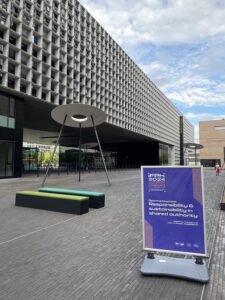
A conference paper I wrote with Charlie Morgan for IFPH2024, the 7th World Conference of the International Federation for Public History, in September 2024.
Abstracts weren't available in the conference programme so I've posted ours below. The abstract was written in November 2023, before we knew how much the ransomware attack in October 2023 was going to make our work with digital and digitised collections difficult-to-impossible for the next year or two.
Listening with machines? The challenges of AI for oral history and digital public history in libraries
Mia Ridge, Digital Curator, British Library; Charlie Morgan, Oral History Archivist, British Library
Almost every aspect of our personal and professional lives has been affected by 'AI' and machine-learning based tools. Digital public history is no exception. How does AI change the types of experiences that libraries, museums and archives can create for the public? How does it change our understanding of participatory history when family and community historians might want to use AI tools with digitised or born digital collections? What does it mean to share authority and co-create ‘knowledge’ with machine learning products, especially AI tools that see the world through the lens of Silicon Valley’s capitalist ‘winner takes all’ attitude?
This presentation shares work at the British Library on an AI Strategy and Ethical Guide for digital scholarship, with a particular focus on the implications of AI for archived oral historians. It will include a case study of the use and applicability of corpus linguistic and digital humanities tools to search interviews, identify themes and select sections of audio for close listening. We will also consider the lessons from this case study for our AI strategy more broadly.
What are the ethical, practical and research implications of using AI to transcribe, summarise or analyse oral histories? What is the Library's role, and that of other professional bodies, in providing guidance for research students and others conducting or analysing interviews on platforms with built-in AI tools (for example, Microsoft Teams / OpenAI's Whisper), or exploring how AI could make oral histories more accessible and discoverable? How might AI tools change processes for quality checking records, and how should AI-generated metadata, transcriptions and descriptions be labelled?
This work builds on previous considerations of the implications of AI for digital public history projects, challenging established models for working with crowdsourcing, user-generated content, and other forms of digital participatory history.